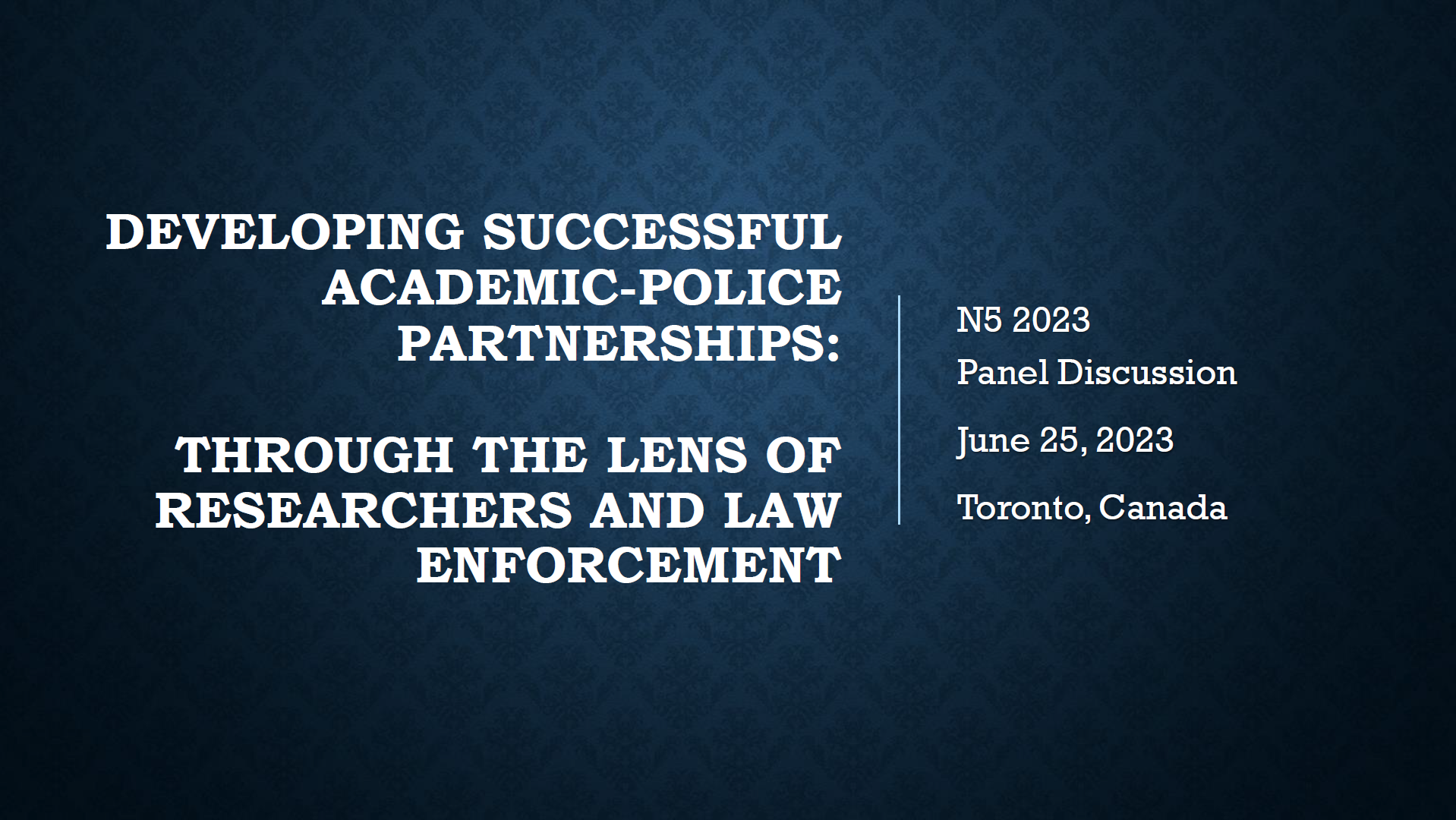
Photo by @glencarrie
Past Events and Pre-recorded Webinars
Coercive Control: What is it, and how do we deal with it?
Dr. N. Zoe Hilton and Benjamin Presta
A public engagement on research priorities for coercive control in Canada
Here are links to three more presentations from the Waypoint Talks- Our IPV Stories Series
Supporting IPV research: What does it mean for healthcare and community organizations?
The value of lived experience in IPV research: Perspectives from lived experience co-researchers
Building trust and addressing challenges in research with individuals who have engaged in intimate partner violence (IPV)
5th Annual Canadian Forensic Psychology Virtual Conference, February 7, 2025
Elnaz Moghimi, Ashley Melvin, Kayla Zimmerman, Alex Knyahnytskyi
Examining Police Officer Utilization of the Ontario Domestic Assault Risk Assessment:
Assessing Risk Mitigation Strategies to Reduce Intimate Partner Violence Recidivism
5th Annual Canadian Forensic Psychology Virtual Conference, February 7, 2025
Denika Widmer, B.Sc. & Mary Ann Campbell, Ph.D.
Treatment Needs and Evidence-based Treatment Planning in Intimate Partner Violence (IPV)
Presentation to the Vancouver Coastal Health Department of Psychiatry, November 19, 2024
Dr. N. Zoe Hilton
Assessing and addressing the hidden crime of stalking: Implications for coercive control: This is a discussion exploring what stalking is, why it matters, and a tool that has been developed to help those being stalked.
A pre-recorded Waypoint Talks webinar with Dr. TK Logan
TK Logan, Ph.D., is a professor in the Department of Behavioral Science at the College of Medicine and the Center on Drug and Alcohol Research. Dr. Logan teaches at the Lewis Honors College and holds joint appointments in Psychiatry, Psychology, Social Work, Sociology, and Gender & Women's Studies. Dr. Logan's research focuses on various critical issues, including stalking and cyberstalking, partner abuse, coercive control, sexual assault, firearm-related risks, and safety planning and efficacy. Additionally, Dr. Logan studies outcomes related to substance use disorder programs (SUD) and the recovery process for individuals with SUDs.
New research from New Zealand explores revictimization and predictive ability of controlling behaviors in police reports to improve intimate partner violence prediction.
Pre-recorded Waypoint Talks webinar with Dr. Apriel Joliffe Simpson
Dr. Apriel D. Jolliffe Simpson is a Lecturer at Te Puna Haumaru New Zealand Institute for Security of Crime Science (NZISCS), University of Waikato. Her research focuses on family and whānau violence, including decision-making, coercive control, risk assessment, and case management by family violence practitioners. She is an emerging scholar and received her PhD from the University of Waikato, New Zealand, in 2022.
How has the criminalization of coercive control influenced policy, practice, and service delivery in the UK?
A pre-recorded Waypoint Talks webinar with Dr. Amanda Robinson
Professor Amanda Robinson is a Criminology Professor at Cardiff University, UK, and also serves as the Co-Director of the Security, Crime and Intelligence Innovation Institute. She played a direct role in shaping the Violence against Women, Domestic Abuse and Sexual Violence (Wales) Act 2015. Her research focuses on improving responses to violence against women and domestic abuse, with a particular emphasis on police understanding of coercive control offenses, culturally appropriate responses to intimate partner violence, and victim experiences within the justice system.
Better Approaches to Ending Intimate Partner Violence
Pre-recorded conversation with Dr. Nadiya Sunderji, Waypoint’s President and CEO, and Dr. N. Zoe Hilton, June 26, 2024.
Waypoint Talks - Improving Approaches to End Intimate Partner Violence
Click here to view: https://youtu.be/iQga-8zFWzc
Victims & Survivors of Crime Week 2024
Accessing Risk, Building Safety - Webinar
Overview of the ODARA purpose, research, and items presented by Zoe Hilton to the Woman Abuse Council of Toronto Victims for the Victims & Survivors of Crime Week 2024
“Accessing Risk, Building Safety Webinar”
Click here to view: https://www.youtube.com/watch?v=4QsZk8auQ_4&t=1962s (ODARA presentation starts around 33 minutes).
Justice Canada Virtual Panels on a Potential Coercive Control Offence in the Context of Intimate Relationships
September 26, 2023 12 pm – 3 pm
Dr. Hilton had the opportunity to present a brief on research conducted on police responses to intimate partner violence in Canada, and on the implementation of coercive control offences outside of Canada, to Justice Canada during its virtual panels designed to discuss the creation of a potential coercive control offence in the context of intimate relationships. This session consisted of presentations by academics, gender-based violence advocates, service providers, police, prosecutors and survivors. A copy of Dr. Hilton’s written submission to Justice Canada can be viewed here.
Free Webinar recorded September 26, 2023 as part of the Waypoint Talks Series offered by the Waypoint Research Institute, Penetanguishene, Ontario.
Coercive control includes non-physical but abusive behaviours that control an intimate partner and coerce them to do what the abuser wants. Coercive control is thought to be a risk factor for severe and repeated intimate partner violence (IPV). Coercive control has been defined in various ways in research, in assessment tools, and in legislation to criminalize the behaviour.
In this webinar, we will present three studies that explored how to measure coercive control using different sources of information: 1. self-reported IPV in a national US sample of young adults. 2. police reports of IPV in Ontario. 3. an attempt to adapt self-report assessments to measure coercive control from police reports. We will discuss how researchers can approach coercive control conceptually and methodologically, and the practical implications for assessing coercive control and IPV risk.
Click here for the Webinar recording and PowerPoint Presentations
Developing successful academic police partnerships: through the lens of researchers and law enforcement
5th North American Correctional and Criminal Justice Psychology Conference, June 2023, Toronto, ON
This panel explored caveats and challenges academic researchers and police personnel navigate when developing effective, impactful, mutually beneficial, and sustainable research. Law enforcement is increasingly engaging in collaborative research and knowledge generation to enhance evidence-based policing. Academic programs and research hubs benefit from access to law enforcement related data. The literature has many examples of successful research collaborations. However, there can be challenges to developing these partnerships, for example: identifying shared research priorities; working with both the academic and police organizational processes necessary for accessing data; aligning goals and communication expectations; and collaborating on knowledge mobilization that accurately translates research findings into applied practice, uses optimal methods for knowledge dissemination, and includes the co-production of materials and reports. This panel discussion included psychology researchers and police personnel with diverse experience and perspectives. The goal of this panel was to help prepare those interested in pursuing such collaborations and is relevant to students, early career researchers and established researchers. This critical discussion was facilitated by the moderator via key questions posed to panel members with a well-grounded familiarity with establishing partnerships.
Free pre-recorded webinar recorded February 2023
This event was hosted by University of Toronto Health and Waypoint Centre For Mental Health Care.
Presenter: Dr. Zoe Hilton, PhD, CPsych Dr. Hilton is a Professor of Psychiatry in the Temerty Faculty of Medicine, University of Toronto, and the Senior Research Scientist at Waypoint.
Presenter: Dr. Sandy Jung, Ph.D., Department of Psychology, MacEwan University Edmonton, Alberta, Canada
Free Webinar recorded on February 1, 2023, free to view anytime.
Intimate partner violence is already a complicated form of interpersonal violence. Problems range from the cycle of abuse to the confusing loyalty exhibited by abused partners. These problems are further complicated by the fact that controlling behaviors of the perpetrating partner often go undetected by others and may be normalized by the abused partner.
What we know is that coercive control is more common in abusive partner relationships than realized. Coercive control is often characterized by the perpetrator’s intention to gain control; the victim not wanting to be controlled; and the presence of threats or implied threats that lace the interactions in the abusive relationship. Because these behaviors often go undetected, this presentation provides a concise overview of the behaviors entailed in coercive control, including what evaluators, treatment providers, supervising agents should be monitoring and assessing.
It is critical for professionals to be able to identify coercively controlling behaviors, in order to effectively evaluate, supervise, and treat abusive perpetrators. It will also be of interest to those working with individuals who may have cause to wonder whether their client, friend, or colleague is in an abusive relationship and offer ideas for intervention.
“Domestic Violence Risk Assessment: Stories and Algorithms”
Professor N. Zoe Hilton
Free pre-recorded webinar from October 13, 2022
This event was held as part of the International Forensic Psychiatry Lecture Series hosted by McMaster University and St. Joseph’s Healthcare Hamilton on October 13, 2022 and will be available until October 22, 2023.
Presenter: Dr. Sandy Jung, Ph.D., Department of Psychology, MacEwan University Edmonton, Alberta, Canada














